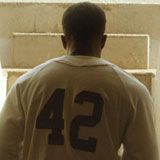About halfway through Brian Helgeland’s Jackie Robinson biopic 42, Harrison Ford growls, "Do you think God likes baseball?" I’m not sure about that, but I know audiences like baseball, and stories about overcoming adversity, and Harrison Ford. All of the elements of a great film are present in 42, which isn't an incandescent biopic like Milk or Ray, but it is solid, and filled with terrific performances.
Ford portrays Dodgers general manager Branch Rickey, who’s dead-set on integrating his team. He picks Jackie Robinson (Chadwick Boseman) out of a pool of players from the Negro Leagues. He's selected for his personality as much as his playing ability; he’s a guy who can absorb the racist rantings and threats of violence without fighting back. As we move around the country with Robinson and his wife (Nicole Beharie), we're witness to racism in both the South and the North. Alan Tudyk plays Phillies manager Ben Chapman, who taunts Robinson to the point where he breaks down off the field, and has a touching scene with Branch Rickey. That scene is the only moment in which Robinson gets any release from his journey as a heroic ballplayer. Throughout most of the film, he's left to fight his battles through the game itself -- and that's where the movie shines.
Boseman squints, crouches, lunges and steals bases like a pro. The entire Dodgers lineup is full of actors with a gift for physicality. I'd watch the entire movie with the sound off, actually, just to better see how Boseman ducks balls aimed right at his head, and scuttles between bases until he finally steals home. But then, of course, I'd miss the best cameo of the movie: John C. McGinley (Scrubs' Dr. Cox) announcing the play-by-play.
On and off the field, Boseman carries the movie. He has amazing chemistry with Beharie, with whom he has an uncomplicated, loving relationship. He has allies in sportswriter Wendell Smith (Andre Holland), fellow ballplayer Ralph Branca (Hamish Linklater), and a whole host of talented people who shield Robinson from hate mail, lynch mobs, hurled epithets and institutional racism. But for all that other people help him, Robinson remains the lightning rod at the center of the integration of baseball. With a single look, an eyebrow raise, a shoulder shrug, he’s able to convey that the weight of the world is still on his shoulders. In a way, he is like a younger Harrison Ford, the guy who could scowl through all of Witness, and then suddenly light up the screen with his smile.
Ford plays an entirely different role here. For the first 15 minutes, I couldn't get over how old and grizzled he is. Eventually he settles into the character, and by the time he's shouting about God and baseball, the tone feels right. There's a strong theme of religion throughout the movie, as Rickey encourages Robinson to "turn the other cheek," and when he argues for the value of integration, he does so by citing his own faith.
The challenge with a story like Robinson's is that no one in it needs to change. Society needs to change. Baseball needs to change. But throughout the film, the racists by and large remain racists, and Robinson remains strong and determined to play ball. "Society" makes for a tricky villain; it's better to have your hero overcome alcoholism or deep personal insecurity. But Robinson wasn't complicated by those foibles, and neither is this movie. There's nothing in Robinson that needs fixing, and nothing that will be magically fixed by Robinson's acts of heroism. If anything, the movie is a reminder that one man's achievements do not put an end to racism -- they only open the door to change.
42 is now playing nationwide.


